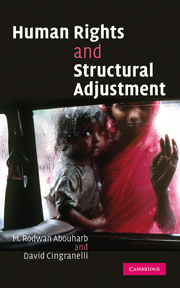Book contents
- Frontmatter
- Contents
- List of figures
- List of tables
- Acknowledgments
- Part I The argument
- Part II Estimating the human rights effects of structural adjustment
- Part III Findings
- 6 Economic and social rights
- 7 Civil conflict: demonstrations, riots, and rebellion
- 8 Torture, murder, disappearance, and political imprisonment
- 9 Worker rights
- 10 Democracy and civil liberties
- Part IV Conclusion
- Bibliography
- Author index
- Subject index
9 - Worker rights
Published online by Cambridge University Press: 30 June 2009
- Frontmatter
- Contents
- List of figures
- List of tables
- Acknowledgments
- Part I The argument
- Part II Estimating the human rights effects of structural adjustment
- Part III Findings
- 6 Economic and social rights
- 7 Civil conflict: demonstrations, riots, and rebellion
- 8 Torture, murder, disappearance, and political imprisonment
- 9 Worker rights
- 10 Democracy and civil liberties
- Part IV Conclusion
- Bibliography
- Author index
- Subject index
Summary
Introduction
As we have shown in previous chapters, countries under structural adjustment for a relatively long period tend to have governments that provide lower than expected levels of respect for economic and social rights (Chapter 7). The deprivations caused by structural adjustment conditions are generally unpopular in less developed countries: anti-government demonstrations occur more often (Chapter 7). Sometimes these protests become violent, increasing the occurrence of riots and organized rebellion (Chapter 7). Governments often respond to these challenges to their authority by increasing the repression of physical integrity rights (Chapter 8). Many country studies have also provided evidence that structural adjustment conditions have led to reduced government respect for worker rights.
For example, comparative case studies conducted by the Structural Adjustment Participatory Review International Network (SAPRIN) took a close look at the effects of structural adjustment programs on workers in Ecuador, El Salvador, Mexico, and Zimbabwe (SAPRIN 2004). The study's findings showed how a combination of labor-market reforms, layoffs resulting from privatizations and civil service reform, and the shrinking of labor-intensive productive sectors had severely undermined the position of workers. Employment levels had dropped, jobs had become more precarious, real wages had deteriorated, income distribution had become less equitable, and worker rights and unions had been weakened. Structural adjustment reforms had allowed employers greater flexibility in establishing the terms and conditions of work, and public enterprises had been privatized without adequate regulation (SAPRIN 2004, Chapter 4; also see Heredia and Purcell 1996; Lloyd 2001).
- Type
- Chapter
- Information
- Human Rights and Structural Adjustment , pp. 183 - 202Publisher: Cambridge University PressPrint publication year: 2007



